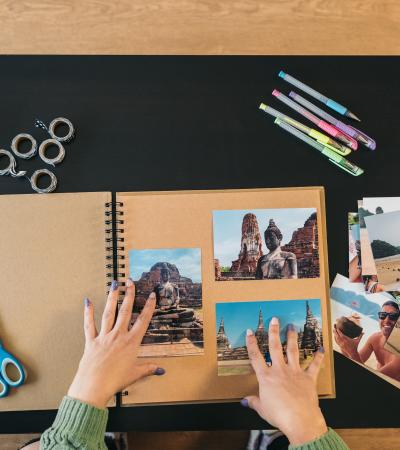Teens
Young Adult
Adults
SuffRAGE Against the Machine: A Zine Workshop
This teen and adult program uses Library of Congress women’s suffrage primary sources, alongside your library’s own databases and physical holdings, to explore the non-conformist, creative and subversive ways that suffragists educated and agitated for the right to vote.
The zine has its roots in the feminist movements of the 20th century, serving as a creative vehicle for knowledge acquisition and transfer. Traditional and mainstream methods of communicating ideas were often off-limits to grassroots social and political movements such as the women’s suffrage movement.
Suffragists, like later feminists of the women’s liberation movement and the Riot Grrrl era, created magazines (zines) to establish their own means of production to broadly communicate their ideas. These methods of information production and distribution often serve to disrupt norms and call out institutions that perpetuate systems of oppression and inequality.
Advanced Planning
Decide whether your attendees will work in small groups or individually. If working in small groups, gather zine-making materials (e.g., printouts of primary sources cleared for fair use, magazines, pens, glue sticks, tape, scissors, staplers) into craft baskets at tables. Each table may focus on a particular suffrage communication style (e.g., propaganda posters, protests and picket lines, suffrage newspapers, cartoons, songs, suffrage fashion, suffrage ephemera) or themes or groups related to women’s suffrage (e.g., civil disobedience, Silent Sentinels). Attendees will focus their zine on the category designated for their table.
If working individually, set up a zine supply station for participants to grab what they need. Print suffrage cartoons, broadsides, ephemera, posters and articles in advance for participants to select and use for their zines. Alternately, participants could identify and print their own items from the Library of Congress digital collections; for this option, you will need to provide access to a printer during the program. Table topics may serve as keyword/phrase searches (e.g., “civil disobedience and suffrage”).
If your library has zines or titles about zine-making in your physical collection, set them out for browsing and inspiration.
Recommended primary sources to share with program attendees:
- “‘Give Us the Ballot!’ The Battle Cry.” Illustration, Clipping. New York Press, New York City, New York, 31 Jan. 1909. The Library of Congress.
- Allender, Nina. ‘“Buy the Suffragist’ Suffragist Week [graphic].” Illustration. The Suffragist, 15 Aug. 1914. The Library of Congress.
- “Silent sentinel” Alison Turnbull Hopkins at the White House on New Jersey Day. 30 Jan. 1917, Photograph, The Library of Congress.
- Anthony, Susan B., Defendant, et al. An account of the proceedings on the trial of Susan B. Anthony on the charge of illegal voting at the Presidential election in Nov., and on the trial of Beverly W. Jones, Edwin T. Marsh and William B. Hall, the inspectors of elections by whom her vote was received. 1874, Daily Democrat and Chronicle Book Print, Rochester, New York, Pdf. The Library of Congress.
- Moses, Luella Strykeroser and Margaretta Ayres Karr. It Is Coming: A Suffrage Song. Sophonisba P. Breckinridge. Music Score. Published by M. Ayres Karr and L.S. Moses ©, Buffalo, New York, 1915. The Library of Congress.
Marketing
You can market this program on your library's social media pages, newsletter and through any outlet your library typically utilizes when promoting programs to patrons.
Budgeting
This program can be planned with no budget. You can print items in advance or have participants come prepared with with their own materials.
Day-of-event Activity
The program follows this outline:
- Facilitator defines “zines,” summarizes their history, and shares physical and/or online examples. See “A Brief History of Zines” on the UNC Chapel Hill Rare Book Blog for background.
- Facilitator gives a brief overview of the women’s suffrage movement. See “The Complex History of the Women’s Suffrage Movement” from the New York Times and “Woman Suffrage Timeline (1840–1920)” from the National Women’s History Museum for background.
- Facilitator discusses tactics and communication methods used by suffragists to fight for the right to vote and to communicate their ideas. See “Tactics and Techniques of the National Woman’s Party Suffrage Campaign” from the Library of Congress: American Memory for background. You may also wish to draw upon “Gidra,” a zine of the Asian American movement available in the Densho Digital Repository, to explore how another group of people struggled to be recognized and gain political agency.
- Facilitator introduces the Library of Congress digital collections and briefly discusses fair use and copyright, explaining how participants can determine what they can print and use from the Library website for the zine project.
- Facilitator gives an overview of workshop steps and goals (small group work, table topics, size of zine, materials).
- Working in small groups or individually, attendees research topics in the Library of Congress digital collections and document their ideas. Attendees work hands-on to assemble their own zines. Facilitators and other library staff assist and answer questions as needed.
- Facilitator calls for each group to present their zines to other attendees. Ask attendees if they recognize any of the same communication strategies being used by political activists today.
- Facilitator wraps up. You may wish to ask attendees to donate their zine to the library for display or to consent to their zine being photographed/digitized for the library’s social media or online repository.
Program Execution
The length of this program can be anywhere from 90 minutes to three hours.
Upon completion of this program, attendees will be able to:
- Understand some of the subversive communication methods that suffragists utilized and how those methods were mirrored in later movements
- Effectively navigate Library of Congress digital collections
- Understand the basics of fair use and copyright
Advice
This program can be conducted in-person, virtual or hybrid. If attendees will be participating virtually, you may invite them to pick up zine-making kits in advance.
Other helpful resources:
Supporting Materials
- Feedback (Coming Soon!)
- Programming Librarian Facebook Group



